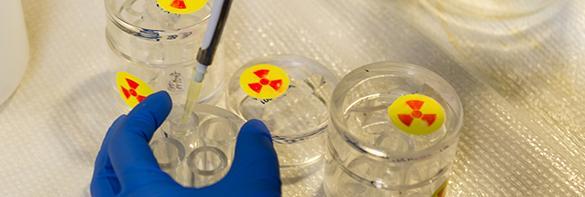FAQs
Who approves the use of radioactive material?
The Weill Cornell Medicine Radiation Safety Committee approves the applications for non-human use of radioactive material under WCM radioactive material license.
Do I need an authorization to purchase radioactive materials?
Yes. In order to purchase, use, possess, and store radioactive material, an “Application for Non-Human Use of Radioactive Material” must be approved by the Radiation Safety Committee and on file in the Radiation Safety Office. In addition, the Radiation Safety Officer must approve the laboratory areas where radionuclides will be used and stored.
Who may apply for an authorization?
Principal Investigators and researchers who can document at least 40 hours of training or experience handling radioisotopes in a research setting may apply for an authorization to use radioactive material in non-human research applications.
Is there a training requirement for use of radioactive materials?
Yes. Researchers working for an Authorized User are required to complete a 3 hour training course and pass a comprehensive exam prior to working with radioisotopes without direct supervision. Each year a radiation safety refresher training is required.
What is the approval process for a radioactive material authorization?
Initial applications and amendments must be approved by the WCM’s Radiation Safety Committee. The review and approval process may take several weeks; therefore, applications/amendments should be submitted well in advance of the proposed use. Applications are available on the Radiation Safety website: http://ehs.weill.cornell.edu/sites/default/files/non-human_isotope_authorization_application_0.pdf
How long is a radioactive material authorization approved for?
Radioactive material authorization is valid until the researcher leaves WCM. The Radiation Safety office may require periodic amendments to the initial authorization.
I share a lab with an investigator who is approved by the RSC to use radioactive materials. Does their approval apply to my work in the shared lab?
No. Authorization is only valid for the individual Principle Investigator and their researchers. You would have to apply for your own authorization even when sharing laboratory space.
What radioactive material is our lab allowed to order?
Your laboratory may only order the specific forms and activities of the radionuclides approved by the Radiation Safety Committee.
Can I submit my order directly to the vendor?
No. All radioactive materials must be ordered through the Weill Cornell Business Gateway SAP System.
May I lend or borrow radioactive material for my research?
No. Radioactive materials can only be transferred to other Authorized Users approved for the specific type, quantity, and chemical form. All transfers are subject to approval by the Radiation Safety Office.
Can I ship radioactive material to my research collaborator from another institution?
No. Radioactive materials can only be shipped by the Radiation Safety Office.
How often must I survey the radioactive material laboratories?
Surveys for contamination should be conducted before and after working with radioactive materials. In addition, contamination surveys using liquid scintillation methods (wipe testing) must be conducted each month that the Authorized User is in possession of any form and quantity of radioactivity.
How often must a radiation survey be documented?
Monthly wipe testing is required by NYC Health Code if the Authorized User is in possession of any form and quantity of radioactivity. The document required is the output from the liquid scintillation counter in units of disintegrations per minute (DPM) or Becquerel’s (Bq).
When am I required to conduct decontamination procedures?
Researchers are required to conduct decontamination procedures when removable contamination exceeds the action levels listed in Table 30-2: Surface Contamination Limits and Actions of the Radiation Safety Manual.

